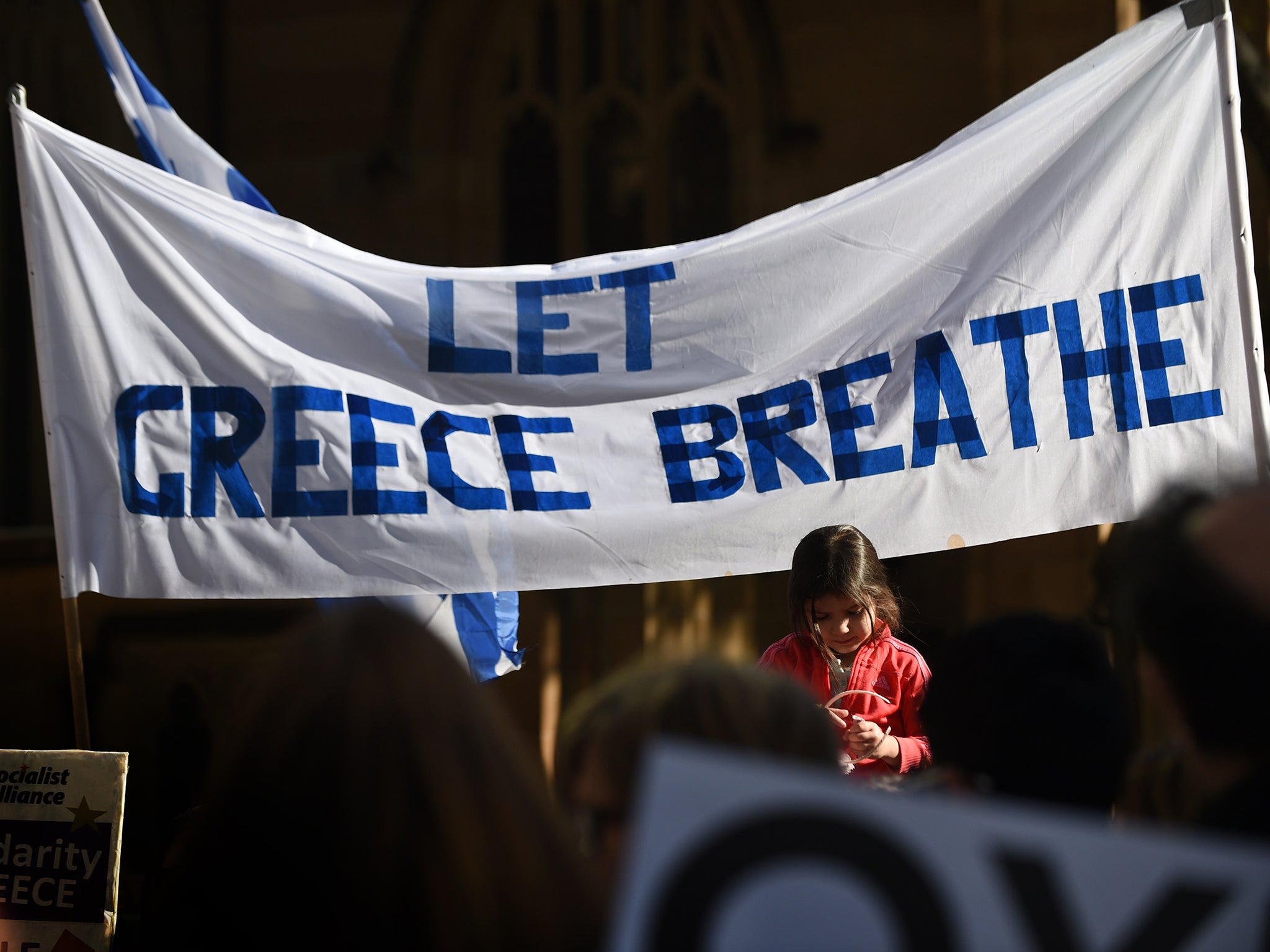Greece debt crisis: How Europe reacted after the Greeks voted 'No'
The referendum has prompted shock in Germany, Italy, Spain and France

Your support helps us to tell the story
From reproductive rights to climate change to Big Tech, The Independent is on the ground when the story is developing. Whether it's investigating the financials of Elon Musk's pro-Trump PAC or producing our latest documentary, 'The A Word', which shines a light on the American women fighting for reproductive rights, we know how important it is to parse out the facts from the messaging.
At such a critical moment in US history, we need reporters on the ground. Your donation allows us to keep sending journalists to speak to both sides of the story.
The Independent is trusted by Americans across the entire political spectrum. And unlike many other quality news outlets, we choose not to lock Americans out of our reporting and analysis with paywalls. We believe quality journalism should be available to everyone, paid for by those who can afford it.
Your support makes all the difference.Germany
Tony Paterson in Berlin
Chancellor Angela Merkel’s coalition appeared to be still reeling from the shock of the overwhelming No vote.
As Ms Merkel flew to Paris for talks with President François Hollande on Monday, her spokesman insisted that there was no basis for any further negotiations, although the door “remained open”.
“We are waiting to see what the Greek government will make of it,” said Steffen Seibert. “ We are waiting to see which suggestions the Greek government will put to its negotiating partners. Greece is in the eurozone. It is up to Greece and its government to see that things stay that way,” he added.
Ms Merkel would only say that she “respected” the outcome of Sunday’s vote. But several MPs within her own Christian Democratic party said they were extremely doubtful that any progress could be made without Greece finally implementing the reforms demanded.
Der Spiegel magazine blamed Ms Merkel for allowing the crisis to develop. It said she could have organised an orderly Grexit several years ago.
Italy
Michael Day in Rome
The government insists it would not fear contagion should Greece exit the euro. But the Prime Minister, Matteo Renzi, has said Europe was “finished” if it failed to embrace major change.
Instinctively, Mr Renzi is averse to siding with his populist political enemies on the left and right who hailed the “No” vote in Greece. It was little secret that he had backed acceptance of the Troika’s last offer. And with one eye on the markets, Mr Renzi is keen to be seen as having prioritised reforms and countered Italy’s reputation as one of the EU’s weakest links.
But, ever the pragmatist, Mr Renzi knows that siding entirely with the Troika won’t wash amid the popular backlash against Greece’s creditors. Yesterday he promoted once again his recipe for dealing with Greece’s and Europe’s debt crisis – what the Italian press is calling Renzi’s “third way”: balancing sound finances with social concerns.
He said major reform of Europe was “no longer postponable”: “If we remain prisoner to rules and bureaucracy, Europe is finished.”
Spain
Alistair Dawber in Madrid
From the moment Sunday’s referendum result was known, Spanish politicians began jockeying for position.
Facing a general election in less than six months, the government has been among the most vocal in pressing that Greece pays what it owes.
It has led a domestic austerity charge that has led to growth. Some ill-informed commentators have inevitably asked whether Spain is next, assuming Greece is dumped out of the eurozone. It’s a nonsense suggestion – the Spanish economy is much stronger and carries less debt.
Luis de Guindos, the Spanish Economy Minister, said the country’s position was “completely different”.
Podemos, a leftist party that campaigns against austerity and which effectively won local elections in May, said that the referendum result was likely to lead to a “sensible agreement” with Greece.
Its leader, Pablo Iglesias, refused to be drawn on whether support for Syriza was good for his party. Spaniards will want to see if the Greeks get a better deal for sticking up two fingers at the “Troika”.
France
Amelia Jenne in Paris
As the No vote edged ahead on Sunday, President François Hollande picked up the phone and made a series of telephone calls.
After speaking to Germany’s Chancellor Angela Merkel, the leaders of the two eurozone countries bearing the greatest burden of Greek debt were quick to display a united front.
But despite the harsh rhetoric coming from Germany, Mr Hollande was reported in the French press to have told Alexis Tsipras, before all the votes were counted, “I’m ready to help you, but I need you to let me help you.”
France’s Minister of the Economy, Emmanuel Macron, also made a thinly veiled swipe at Berlin, urging it against “making a Treaty of Versailles out of the eurozone”.
The left-wing “rebels” in Hollande’s Socialist party were thrilled with the result – some even travelled to Athens to support the No camp. But the leader of the centre-right UMP, Nicolas Sarkozy, said that the Franco-German entente was at risk.
Join our commenting forum
Join thought-provoking conversations, follow other Independent readers and see their replies
Comments